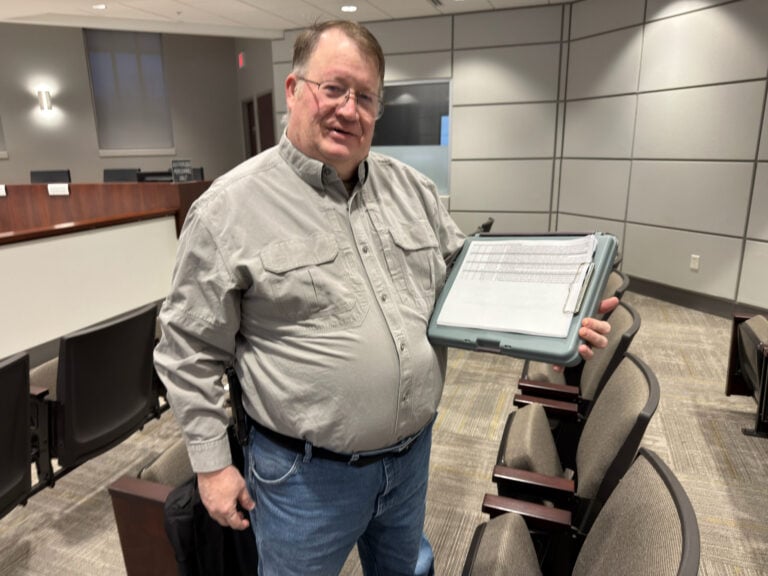By Patricia A. Scheyer
NKyTribune reporter
Fort MITCHELL
Fort Mitchell city council approved the dissolution of the Ft Mitchell Economic Development Authority, which is related to the Ft Mitchell Gateway TIF.

A municipal order passed after discussion which authorized disaster and emergency response overtime for exempt employees.
Another municipal order approved the sale of surplus equipment from the police and fire department.
Ft. Mitchell CAO Edwin King said that the fence has been installed on Grace Avenue, and it had already been hit by a vehicle.
The city will have an Arbor Day tree giveaway on April 26, from 8 a.m.-noon.
LAKESIDE PARK
Amanda Peters, from the NKY Office of Drug Control Policy, came to the regular council meeting in Lakeside Park to see if Lakeside Park will commit two years of their opioid settlement money to the Kenton County Multi-Jurisdictional Law Enforcement Navigator program, which would provide police social workers for the cities who have signed up. So far, Taylor Mill, Villa Hills, and Crescent Springs have signed up, and Erlanger and Independence have their own. Peters is still talking to other cities. Mayor Paul Markgraf said he thought it was a good idea because the city will not receive enough settlement money to start their own police social worker program.
Several residents came to the meeting to express their feelings on whether the city should allow backyard chickens. Eighteen residents spoke, and of the people who spoke about chickens, 8 supported the idea of the right to have chickens and 8 spelled out clearly that chickens are ‘dirty, noisy and smelly, and attract pests and predators.’ Caroline Colvin, who made that comment, is a health care provider at Childrens’ Hospital. Beth Wilson indicated that her autistic daughter has an emotional support chicken, and she asked, if council votes against having chickens, that those that already have chickens be grandfathered in. Her sister came from Warsaw to speak about how beneficial the chickens have been. Libby Baker said she has experience with chickens, and in her opinion, they are ‘mean and peck you.’ She said she had a petition opposing chicken ownership in the city and asked people to sign, but some people said they wanted to sign, but they were afraid because of backlash from their neighbors, something that devastated her. Another resident said she grew up in the country and was a 4H kid, so she is not anti-chicken, but she does not think chickens belong in the city. She said if council approves livestock in the backyards, she wondered where it would stop and ventured that she liked little pygmy goats, who could probably be controlled by an electric fence. She did have a petition with 23 signatures against having chickens.

Mike Mckeown was against the chickens, but he said he has lived in the city for 20 years, and he likes the way the city is run. He stated that since one activist council member has been on council, the city has been distracted with niche issues like sidewalks and chickens, which he said makes the city look ridiculous in the media.
The city sent out an email to residents last Friday that spelled out rather sternly how people can address council but they have to be civil and respectful. That email intimidated some residents, and one resident said she was shocked at the content of the email.
Mayor Markgraf made a point of thanking people for sharing their feelings, and said the email with the executive order was not meant to be intimidating at all.
Joan Arlinghaus said she has chickens and has never had coyotes. She does have hawks, but she had them before, and said bird feeders attract them. She and Beth Wilson had called the city to ask if there were any rules about owning chickens and was told they are governed by the nuisance law, and they could not have roosters. Arlinghaus said the chickens are her pets – she is not raising them. She also said 16 of 19 other cities in Northern Kentucky have chicken ordinances and they ought to check with them. Jim Wilson said chickens are not considered livestock, they are considered poultry. He said there is a Kentucky law protecting emotional support animals, and his granddaughter needs her chickens.
When the ordinance that would allow chickens was read, Council member Cassi Schabell made a motion to amend the ordinance, adding some items that would tighten up regulations for those that have chickens. However, no other council member voted for the amendment and it died for lack of support.
When the actual ordinance came up for a vote, council member Schabell voted yes, but Tom Bernheimer, Mary Ann Thaman, Brian Waite, and Dennis Landwehr voted no, so the ordinance failed. Council member Dave Wolper was not present so he could not vote, but he had sent an email voicing his dissent to the ordinance.
Council member Schabell made a motion at the end of the meeting to grandfather in the residents who already have chickens, so they can keep them, but no one seconded the motion so it failed.
Council did vote unanimously to execute an interlocal agreement with the Kenton County Fiscal Court for the use of national opioid settlement funds.
PARK HILLS
Sean Mendell, the Assistant Executive Director of the Behringer Crawford museum, came to the regular council meeting Monday night to talk about the things happening this year at the museum to celebrate the 75th anniversary.

He said that every floor in the museum has something from when the museum started in 1950. The second floor has the much remembered two-headed calf, and one floor has the glowing minerals, also a very popular item in the early days.
He said they have 31,000 visitors every year, and 14,594 people who have attended the nature play area, or the free area near the bottom of the hill. They have a display currently on Harlan Hubbard, and a book that was written about him called Driftwood. The concerts should begin again soon. Mendell also told council about the myriad educational programs that the museum has, and how they can take it into the schools, or the libraries and the parks.
The museum also hosts virtual programs, and they have had 72,853 views on the programs they have presented.
Council appreciated the update.
A municipal order passed which renewed the contract with the city of Bromley for police service. There was some discussion on if the city should raise the price, but Police Chief Cody Stanley was firm in his recommendation of keeping the price the same. He told council members that he doesn’t feel that the price should be raised, first of all because it is a renewal of a contract, and secondly because not much happens in the city and he and his officers don’t have to do much. In the end, the contract was renewed, and the price stayed the same, although council member Sarah Froelich voted no.
The contract for EMS service with the city of Fort Wright passed, and the service will be renewed for two more years. The first year will be $114,490 in four payments, and the second year will be $125,939 in four payments.
FLORENCE
Florence city council listened to Todd Morgan, Director of Community Development talk about a request for a zone change from C2 to C3 for a .35 acre site located at 6809 Burlington Pike. Currently the site has an old vacant bank building on it, and Bluegrass Cannacare LLC wants to put a medical marijuana store on the site. The owner, Jason Culter, said they probably would not be open on Sunday, which answered a question by council member Angie Cable about the traffic in that area on Sundays in particular, when the 7 Hills Church convenes and lets out. Culter said the other days they would probably be open from 8 a.m.- 5 p.m. Monday through Saturday.

Council member Patricia Wingo is on the committee for planning and zoning, and she said the state restrictions for these types of businesses are very strict. For instance, they are not allowed to have more customers in the building than there are employees, the customers have to have a medical marijuana card to be able to enter the building, and nothing is permitted to be on display inside the store. She said the owner views it as a pharmacy.
The second item up for discussion at the caucus meeting was a change in concept development plan for a .56 acre site located between the vacant Frisch’s building and the Chipotle at 7303 Turfway Road, pretty much across the street from where the first business is asking to be located. Again, Council member Cable mentioned the traffic from the 7 Hills Church which is considerable when the church has services. Florence police are on hand every Sunday to help direct traffic, and she feels that putting a coffee place right across from one of the exits from the church would only add to the traffic problems.
The company is 7 Brew, from Arizona, and recently they came to the city for another location in Florence, on US42 next to the White Castle.
Both of these items were forwarded to Florence by the Boone County Planning Commission, with a favorable vote.
About a half hour after the caucus meeting, the city held a public hearing on the issue of solar energy. Boone County passed an ordinance with regulations for solar energy companies and the storage of batteries, because Judge Executive Gary Moore does not want huge solar energy farms that occupy regular farmland and detract from the rural aspect of the county.
Florence tweaked the ordinance to make it more urban and fit it to the needs of the city.
When it was introduced at the council meeting, council members Angie Cable and Lesley Chambers wanted another public hearing because they didn’t know about the one that the Boone County Planning and Zoning held.
Six people signed up and spoke at the meeting.
“Many of the comments at the public hearing focused on the general benefits of solar energy, but the issue before council isn’t whether solar energy is good or bad,” said Florence CAO Josh Hunt. “It’s about how solar energy systems are treated as accessory structures under our zoning regulations.”
He explained that from a zoning standpoint, the solar energy systems are no different than the city treats other accessory features, such as generators or dumpsters. He said that the amendment before council provides a consistent and thoughtful framework to make sure that solar energy system installations are appropriate as far as aesthetics, scale, screening and context.
Mayor Julie Aubuchon thanked everyone for coming and sharing their opinion.

















